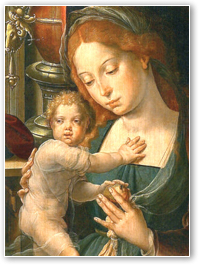Privilege and Christianity
- DAVID G. BONAGURA, JR.
"Privilege" is now a loaded word, launched to belittle opponents and to cut off meaningful argument before it starts.
 A privileged person, the thinking goes, has received unmerited favors that elevate him above others who are struggling to succeed against the odds.
A privileged person, the thinking goes, has received unmerited favors that elevate him above others who are struggling to succeed against the odds.
To level the playing field, the privileged have to be knocked from their perches: they must be silenced in the court of public opinion. Their lofty social status has nullified their First Amendment right. Those who yield to the accusation of "privilege" find themselves in a paradoxical state of self-contradiction, doing penance for a sin they did not, and cannot, commit, while being unable to make a firm purpose of amendment, since the sin is part of their very selves.
Conversation about privilege has been a one-way street, entirely secular in character, and dictated by the identity politics movement. But if we recast privilege under the light of the Christian faith, we learn that the privileged in our society are not evil people, but the very ones who should be leading the quest for authentic justice on behalf of those who in need of it.
A privilege is a benefit or immunity granted to a person or group beyond what others possess. Its origin resides in ancient Rome as a "private law" (privus-lex) aimed to help an individual.
Analogies between the civic world and the divine order are never perfect, but the Christian understanding of grace offers a fresh perspective on privilege. Grace is the free, unmerited gift of divine life that God bestows on those whom He wills for the sake of salvation.
God offers sufficient grace to all His children to be saved, though some receive more than others, e.g., Catholics as opposed to non-Catholics, or, within the Catholic family, St. Francis and St. Teresa of Calcutta compared to most of the rest of us. In light of an individual's vocation, grace can be understood as a privilege, a benefit granted by God through which an individual or group fulfills a unique calling.
We see that grace produces a supernatural privilege in the dogma of the Immaculate Conception. "The most Blessed Virgin Mary was, from the first moment of her conception, by a singular grace and privilege of almighty God and by virtue of the merits of Jesus Christ, Savior of the human race, preserved immune from all stain of original sin."
The Blessed Mother then shows us the proper response to receiving a privilege from God: gratitude and humility. "My soul magnifies the Lord, and my spirit rejoices in God my Savior, for he has regarded the low estate of his handmaiden. . . .For he who is mighty has done great things for me, and holy is his name." (Luke 1:46-49)
From Mary's disposition, we see that God does not give the privilege of unmerited grace for a person's aggrandizement. It comes with the obligation to serve God and one's neighbor, as the parable of the talents makes clear. If Catholics fail to use their privilege for divine ends, the Second Vatican Council unequivocally reminds them that "not only shall they not be saved but they will be the more severely judged."
The Blessed Mother then shows us the proper response to receiving a privilege from God: gratitude and humility.
By contrast, rather than see privilege with the light of gratitude, the identity politics movement has recast it in the language of resentment. Like the first hired laborers in the parable of the vineyard, those who wield "privilege" as a cudgel refuse to see the graces they have received because they are consumed with envy over the graces that others have received.
Identity politics, to reach its vision of social justice, has ostensibly sought to right societal wrongs and to help the disadvantaged, but has succeeded only in tearing down the advantaged. To do this, the movement has demonized "privilege" in general, and two "privileges" in particular — namely, those of ethnicity and sex — while ignoring the fact that the endowment of such privileges occurs in the lottery of birth, far outside anyone's control.
Privileges, given the natural imperfections of human beings, will always be part of any society, as will inequalities that may follow from them. Some exercises of privilege are good, such as giving pregnant women priority for seats on the subway or giving senior citizen discounts at restaurants. Other inequalities are downright evil, such as zoning school districts with racist intent. One thing is certain, however: slandering citizens for their appearance, under the mantle of privilege, brings not peace and justice, but discord and rancor.
What will bring peace and justice to society is looking honestly at our societal privileges, whatever they are, as Christians ought: gifts to be used not for self-aggrandizement, but for building the common good. President John F. Kennedy's exhortation to ask what good we can do for our country is the civic parallel to how God asks us to respond to the privileges He grants: "Master, you delivered to me five talents; here I have made five talents more." (Matt 25:20)
Privilege is nothing to apologize for. If God grants privileges in the supernatural order, it follows that they can exist in the natural order as well. If privileges, both divine and social, are received with gratitude and humility, then we can expect to see the privileged as the ones acting charitably and working for justice for the disadvantaged. The Christian tradition has a name for such privileged people — they are called saints, which we are all called to be.
 This is Meaghen Gonzalez, Editor of CERC. I hope you appreciated this piece. We curate these articles especially for believers like you.
This is Meaghen Gonzalez, Editor of CERC. I hope you appreciated this piece. We curate these articles especially for believers like you.
Please show your appreciation by making a $3 donation. CERC is entirely reader supported.

Acknowledgement
David G. Bonagura, Jr. "Privilege and Christianity." The Catholic Thing (October 18, 2020).
Reprinted with permission from The Catholic Thing. All rights reserved. For reprint rights, write to: info@thecatholicthing.org.
The Author
 David G. Bonagura Jr. teaches at St. Joseph’s Seminary, New York. He is the author of Steadfast in Faith: Catholicism and the Challenges of Secularism. He resides in Floral Park, New York, with his wife and four sons.
David G. Bonagura Jr. teaches at St. Joseph’s Seminary, New York. He is the author of Steadfast in Faith: Catholicism and the Challenges of Secularism. He resides in Floral Park, New York, with his wife and four sons.




